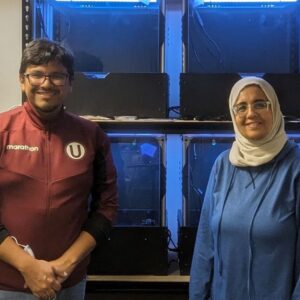 Authors:
Authors:
- Marcos Inonan, he/him, Research Assistant, Electrical & Computer Engineering, University of Washington, Seattle campus
- Rania Hussein, she/her, Associate Teaching Professor, Electrical & Computer Engineering, University of Washington, Seattle campus
Project Description
This project investigates the impact of digital inequalities on equitable access to Remote Laboratories in engineering education, using a mixed-methods approach that includes a student survey. The study identifies barriers and proposes strategies to address digital disparities, aiming to inform educators and policymakers about the importance of integrating technological components to enhance inclusion and equitable access to remote learning educational tools.
Project Question
How do digital inequalities hinder equitable access for students learning with Remote Engineering Laboratories in engineering?
Context
As Remote labs are more prevalent in engineering curricula, some students may be impacted by digital inequalities. To explore this further, the Remote Hub Lab (RHL) research group surveyed 81 students enrolled in a sophomore-level digital design course that utilized a remotely accessible Field Programmable Gate Arrays (FPGAs) lab in Autumn 2022. The survey aimed to gauge their perspectives on equitable access and digital inequalities based on their experience with the remote lab.
Methods
Initially, we conducted a literature review exploring existing literature on digital inequalities in education, which is categorized into three levels. These levels were adapted to the context of remote laboratories. This adaptation allowed us to conduct the survey in three levels: Demographic data, Connectivity, and Digital Equity. We employed a complementary mixed-methods approach to elaborate, enhance, illustrate, and clarify the results from quantitative data with those from qualitative open responses.
Impact/Assessment
The findings of this study conclude that students appreciate remote laboratories for their accessibility, but factors such as poor Wi-Fi quality at home and inadequate maintenance of internet-connected devices have been identified as hindrances to college success among low-income students. To enhance the learning experiences of minority groups and address these challenges, new developments in remote labs by the RHL incorporate components aimed at promoting equitable access. One example is the remote laboratory for wireless communication, RHL-RELIA. This lab offers a web browser interface that minimizes the need for specialized software and can be accessed from simple devices like smartphones, thus reducing dependency on computers and Wi-Fi access.
Application
Instructors can recognize the importance of addressing digital disparities in their instructional environments to mitigate the impact of disparities on student learning with remote tools. These disparities are not limited to specific disciplines or geographic areas, but are prevalent worldwide. In line with this, the RHL group is conducting a new study to identify digital disparities in Latin American regions by examining student perceptions of the RHL-RELIA lab. To facilitate this, the RHL-RELIA lab is adapted to support Spanish and Portuguese languages, enabling investigations into digital disparities in other countries. These initiatives aim to empower students by providing courses characterized by equitable access, ensuring equal opportunities, fostering flexibility, enriching learning experiences, and promoting inclusivity.